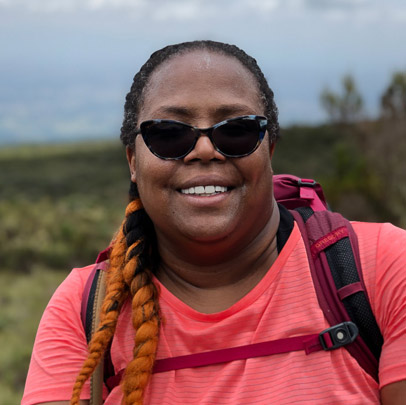
By Bisa Myles
Travel Writer18 Jun 2019 - 5 Minute Read
Every blog post I had read, every YouTube video I had watched, by someone who had hiked Mount Kilimanjaro, said it was the most challenging thing they had ever done. In my life, going through breast cancer was the hardest. If climbing Kilimanjaro was going to be tougher than that, I wasn't confident I could make it. To add to the challenge, I weigh twice as much as the average hiker. It helped that I was going be attempting it with 19 other plus-sized women – we called ourselves the Curvy Kili Crew.
It all started when I commented on an Instagram post by blogger Christa Singleton (Travel Fearlessly) about her Kilimanjaro climb. Christa told me she was organizing another climb, and that she wanted to hike with women who understood the struggles of finding gear that fitted, and could support each other during training and on the mountain. Hiking Kili had never been on my “survivor’s list” of things I planned to do, but I did enjoy adventure and was up for the challenge. I knew what it was like to be stared at for being overweight, and feel like I didn’t belong.
After nine months of training, it was day one of our climb. We started hiking in the afternoon, walking single file through the forest, excited and eager to get to Simba, the first camp. We were told to go polepole, which meant “slowly” in Swahili. The dirt trail took us through tall trees, over bridges, and past wildflowers that only grow on this mountain. We kept our eyes open for Colobus monkeys lurking in the treetops. About halfway up, we broke into smaller groups. I was in the slower group, and eventually found myself alone with a guide and a porter. When I made it to Simba, everyone was singing and dancing, celebrating the end of day one. I was so tired, I just sat down by the sign, trying to summon the energy to find my tent.
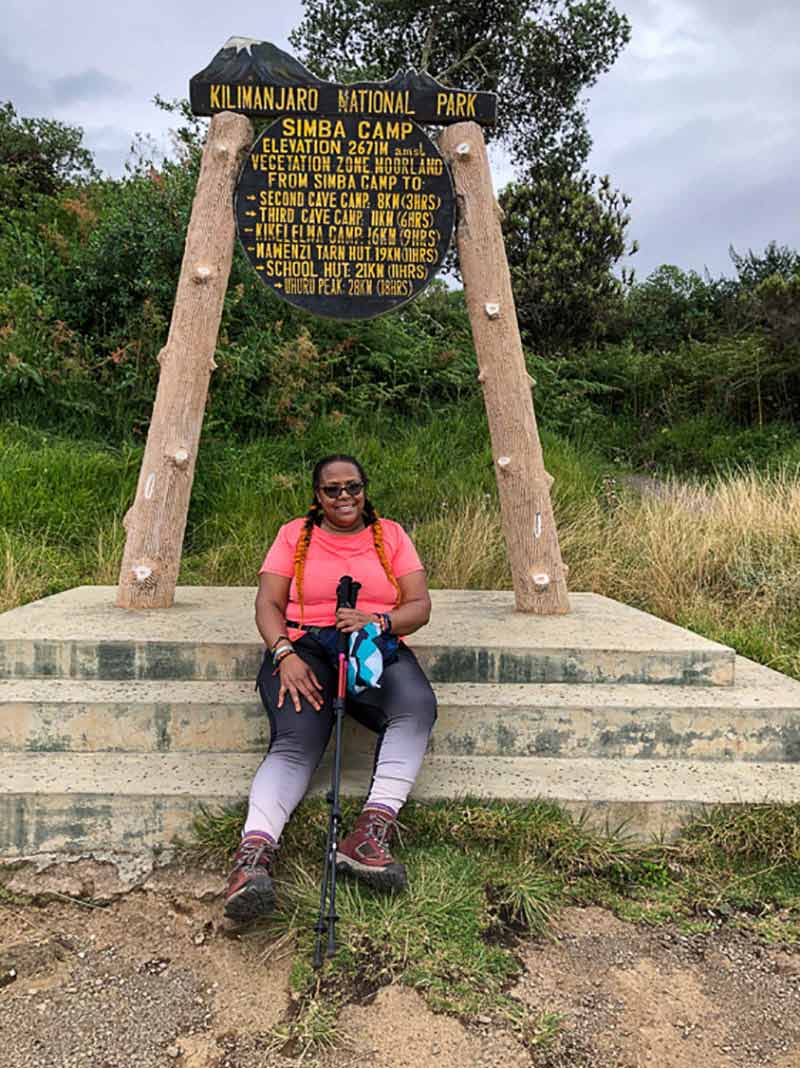
I didn't sleep well that first night – my legs were cramping from the hike. The next morning, we lined up again and I automatically went to the back, because I knew my pace was going to be slower than everyone else. Today, the ground was rockier, and the temperatures warmer. By midday, I thought I had made the biggest mistake of my life. I could feel tears filling my eyes, and then the negative voices started in my head:
“You’re too fat!”
“You’re not healthy enough!”
“You don’t belong here!”
The only way I was going to get off this mountain was in a helicopter. I was done. At that moment, I couldn’t remember why I wanted to climb Mount Kilimanjaro in the first place. I had to ask myself, “Is this the hardest thing I have ever done?”
I closed my eyes and thought back to those six months in 2016 when I had cancer.
I could still smell the drugs seeping from my pores; I could feel the dull ache of my joints; swallowing with a dry mouth; struggling to keep down the little food I was able to eat; I could still see the burn marks on my neck from radiation.
The answer was no.
I kept walking. It felt like hours until I could see the tops of the dining tents, but I made it. I dragged myself to one of the chairs that were lined up around our tents. A few other women were already there, going over the day – the consensus was that today sucked. I felt relieved that I wasn't the only one who struggled. But, we were all prepared to wake up the next day and do it again.
And we did.
I felt stronger and more confident that night than I’d felt in a long time. I have no regrets.
The ground flattened out as we went higher, and there was no shade from the sun anymore. By the fifth day, I had mastered the pace of polepole, and arrived at camp more than an hour after everyone else. It was summit night, and everyone had to be up and ready by 11pm. I was sick with a cold, and had only gotten two hours of sleep. So, I decided not to attempt to summit Kilimanjaro – instead, I watched the sunrise from base camp. I thought I would be upset that I didn't make it to the top. But in fact, I felt stronger and more confident that night than I’d felt in a long time. I have no regrets.
Going down the mountain was just as challenging as going up. On the last day, when we still had 12 miles to go, I knew I probably couldn't make it all the way, but I wanted to have one final day with the mountain. I walked down with my sun- and wind-burned face, aching toes, and a week’s worth of dirt covering my clothes and hands. I made it to the halfway point and took jeep the rest of the way, both happy and sad that the hike was over.
We all achieved our own personal summits on this trip. Although I probably shouldn’t compare climbing a mountain to fighting cancer, I did learn a similar lesson from both experiences – that I can do hard things and survive.
Discover similar stories in
fear
Travel Writer
Bisa Myles is a plus-sized, solo adventure traveler, writer, and breast cancer survivor.
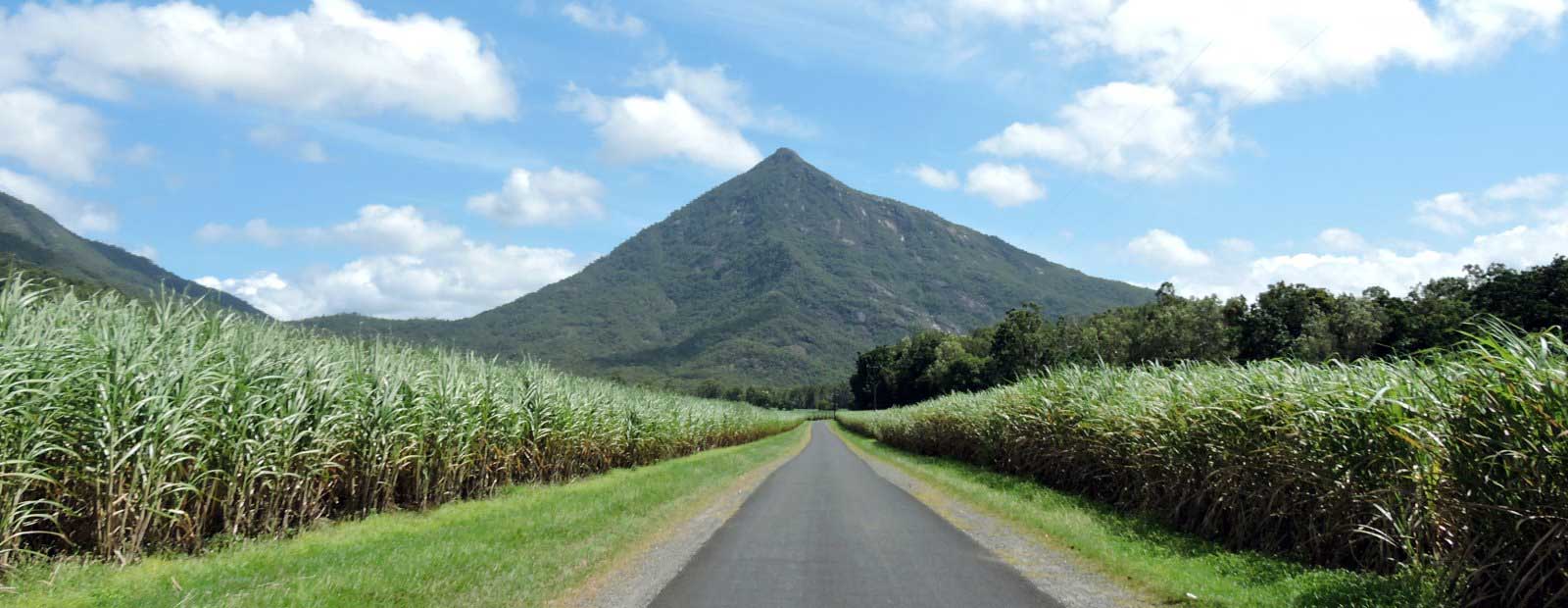
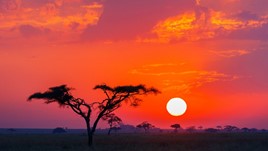
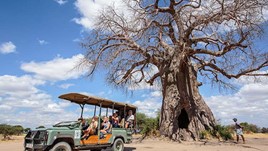
10 Comments
Congratulations again, Bisa. You are wise to know your summits can change, as they did on the mountain. You adjusted for them, continued to be successful, and you finished on your terms. You are a true survivor!
I knew you would learn things about yourself and rediscover that strength and grittiness that helped you beat cancer. You reminded those demons whispering in your ear that YOU are more powerful than their fear-based lies. After all, you are a breast cancer thriver!
Thank you for sharing your story. You and your achievements are reminders that I should greet life fearlessly, climb all of my mountains and I, too, can survive hard things. I can’t wait to see what you conquer next!
I´m so happy to read this. Thank you for sharing your conquers.
Hey Bisa,
Thanks for being an inspiration! I didn't dare to attempt the full hike, taking only a one-day hike to the Mandara Hut (2,720 m) and I could already feel the strain. Kudos to you for completing the hike! Mountains are such magnetic beings they keep you wanting more - they're beautiful, they're challenging, they are so difficult but like all good teachers in life - they give us good lessons. I am not usually one to train specifically for hikes, so I only attempt mountains that are within my physical abilities. Last September, however, I miscalculated a bit because what I thought would be an easy autumn hike at Hokkaido's Kurodake turned out to be a snow hike I was unprepared for. It took far longer and tougher than any hike I've taken but it was a good lesson on mental fortitude. We often underestimate our strength as human beings, but when we're up against a challenge, especially one that we ourselves have decided on, we must have the courage to see it through.
Thank you for your wonderful, inspirational story. I needed to hear it now more than ever. Love to you on your life journey.
Bisa, thank you for this story. I went through cancer treatment about a year after you did, and I want to climb Kilimanjaro or Mt Kenya. I have had lots of self doubt, but you are an inspiration for me to do this when the pandemic is behind us.
Thank you so much.
Thank you for sharing your story. You must be an amazing person, a fighter ..... you accomplished what you put your mind into. I thought about climbing Kili several years ago and felt that it is too hard for me...and I do not experience all challenges you do! Kudos to you, Bisa!! Keep fighting!
Bisa, you are one amazing and brave woman. I would love to do that climb. I’m 69 with exercise induced Asthma, but what a trip! I am so proud of you for not giving up on your climb. Not reaching the top will happen another time for you.
Thank you so much for the lovely comments. I'm happy that I could inspire all of you to live out of your comfort zones.
We are all stronger than we think we are.
Bisa
Dear Bisa. Thanks for sharing your experience. Well done to be getting where you did on your Kilimanjaro trek. Even an average not a plus size person could not guarantee a summit success or have the courage to even attempt the trek at all. You are such an inspiration and I am inspired. Take care and GOD bless.
This is a well written story. You captivated me with your words. Thank you.